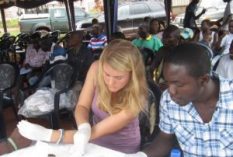To begin with, the college application process was daunting. My family didn’t have the money to send me to university, so my final decision was based on where I could get a full scholarship. Fortunately, I wound up attending the University of North Carolina at Chapel Hill, which in addition to its generous academic scholarships for out-of-state students also boasts one of the most comprehensive offerings of scholarships for studying, working, researching, and interning overseas. It was an aspect of UNC I never paid attention to as a prospective student, but it made all the difference in my college experience, and in reality the rest of my life, once I enrolled.
Thanks to the rich array of opportunities and funding to match, I was able to study in Singapore, China, South Korea, conduct field research in Central America, and land an internship in Egypt — for free. Granted, I had to spend countless hours filling out applications and acing competitive interviews, but the opportunities were there. As a result, I spent more than 25% of my time in college overseas, and the experiences I gained from both studying and working abroad helped set me up for landing a job in management consulting and later in international sales and marketing. It wasn’t until I swapped stories with my peers at other universities that I realized how truly (and unintentionally) blessed I was to wind up at a college that actively prioritized sending students abroad — and helping them afford to do so.
Back then; I could never have predicted how important study abroad would be to me throughout my college experience. Study abroad offers the opportunity to learn about other cultures firsthand, learn or practice a foreign language, expand your global network, and even improve your prospects for employment after graduation. In general, it matures you into a more independent and tolerant person with a greatly improved understanding and curiosity about the world. Yet it didn’t even occur to me to look at how my school would help me gain this international experience (and even finance it) while I was in the midst of applying and contemplating moving halfway across the country when I had scarcely ever left my home state.
Like I experienced, most prospective students analyze a complicated matrix of qualities when choosing a college, including location, size and personality of the student body, strength of the academics, cost and financial aid, student-faculty ratio, and even job placement rates upon graduation, but they usually don’t stop to consider other programs or opportunities that only begin to matter after enrollment, like opportunities to study or work abroad.
A 2013 study from the Institute of International Education (IIE) found that about 280,000 American students studied abroad during the 2012-2013 academic year. While these numbers are a record high, study abroad — and especially students doing research or internships abroad — are still a tiny fraction of the 17.5 million of students enrolled in university in the United States (2015 National Center for Education Statistics). There is a substantial opportunity gap, particularly when it comes to minorities, first-generation college students, and those from lower income families. Students of certain academic disciplines, especially science and math, also find it hard to find opportunities overseas that are well matched with their rigorous curriculum.
If going abroad is a priority for you, it’s better to start planning for it sooner rather than later. By critically evaluating what opportunities a university provides prior to enrolling, you can rest assured by the time sophomore or junior year rolls around, you’ll have plenty of choice when it comes to selecting and financing your time overseas. Whether it’s a matter of cost or availability of suitable academic programs (and ones that honor credits earned overseas to help students graduate on time), it’s important to consider these factors before securing your place in the incoming freshman class.
Meeting other cultures is a big part of the study abroad experience
Here is a list of questions to help you factor opportunities to gain international experience as an undergraduate into your college search. These questions are best directed at the office or department directly responsible for study abroad. A lack of this kind of dedicated office should be a red flag from the start.
- What programs are offered to study abroad?
- How much do they cost?
- Are there semester, yearlong, summer, and winter programs?
- Which do most students choose?
- What percent of students study abroad?
- What percent of those students receive financial aid to study abroad?
- When do most students go abroad?
- Do students go abroad multiple times?
- What percent of students go abroad multiple times?
- Are there scholarships for study abroad?
- How many exactly?
- Are they offered through the university itself or a third party?
- How are those recipients chosen: need or merit?
- What help is available to students seeking outside funding?
- What percent of students do internships?
- What percent are able to do internships overseas?
- What financial support is offered for students doing internships abroad?
- Is it need or merit based?
- Can I apply my federal financial aid towards the cost of a program abroad?
- Does the university offer its own study/work abroad programs or does it contract with other providers?
- Does the university recognize credits from a wide variety of programs or only the ones they specifically organize?
- Will studying abroad delay my graduation?
- Are there programs abroad available in my chosen program of study?
- Is there a foreign language requirement for this school?
- Does this school teach the foreign language I want to study and offer corresponding study abroad programs?
- I don’t speak a foreign language. What opportunities will there be for me to go abroad?
- What outlets are available for students returning from experiences overseas?
Notice that these questions are very specific and don’t leave room for vague “yes” or “no” answers. For example, instead of asking, “Is there help available to students seeking outside funding?” Instead, ask more directly: “What help is available to students seeking outside funding?” This ensures that the college or study abroad representative speak in detail about what offerings they have (or don’t have). These questions also ask for percentages and other quantitative figures to describe the level of participation or support of study abroad in a concrete way.
By making study abroad an important part of your college selection process, you can help make sure that this aspect of your future college experience won’t be overlooked and result in limited opportunities to experience one of the greatest parts of being a university student.
Global Nomadic offers Professional Internships, Volunteer Projects and TEFL Programmes in 29 countries worldwide. Start travelling your career today!
A former NYC management consultant turned legal nomad, Elaina Giolando writes about the intersection of career, life, and travel for today’s 20-somethings. She currently works as an international media representative, traveling to a new country every 3 months to live and work. In her spare time, she focuses on providing her peers inspiration to proactively create rewarding and unconventional lifestyles. Follow Elaina on her blog Life Before 30 or @_LifeBefore30.











